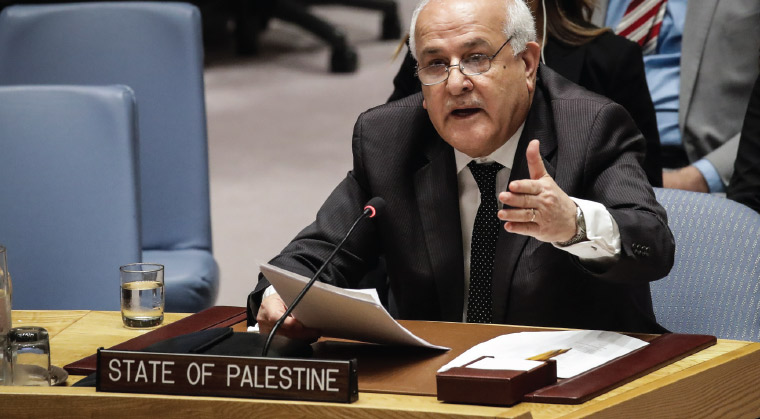Palestinians Test Their Limits


Photos: AFP/IMAGEBANK
I
f the Palestinians are worried about losing American financial assistance, they sure aren’t showing it.
Last week, the Palestinians joined a United Nations trade organization called UNCTAD, an industrial development agency called UNIDO, and the Chemical Weapons convention, administered by an independent international group affiliated with the UN.
All the moves, by law, should trigger financial sanctions against those organizations, as legislation on the books prohibits funding of UN agencies that extend membership to “Palestine.”
Upping the ante, the Palestinian Authority also filed a complaint against Israel in the International Criminal Court in the Hague last week, alleging “grave crimes” against the Palestinian people during the recent Gaza riots.
Make no mistake — this will be no small diplomatic headache for Israel, which is planning on publishing its own report on the Gaza incidents. But a senior Israeli source told me, this time, at least, no one is overly worried. “We feel this is just one part of the bigger picture. The Palestinians realize the UN Security Council is no longer their home field. So they’re firing in all directions — running to the UN Human Rights Council and the Organization for the Prohibition of Chemical Weapons, trying to hit us any which way.”
All these moves come in the context of past promises by the Trump administration to cut funding to the Palestinian Authority. Back in January, President Trump announced his intention to cut back funding to UNRWA, the UN agency that supports Palestinian refugees, from $125 million to $60 million, after the Palestinians severed ties with the US over in November 2017 over “unacceptable measures” by the Trump White House. Additionally, the newly passed Taylor Force Act prohibits American funding to the PA as long as it continues providing stipends to terrorists and their families.
Surprisingly, despite it all, sources in the White House say that President Trump and his Middle East advisors still plan to unveil a peace proposal by mid-June. But assuming the various legal and administrative barriers to Palestinian-American relations could be overcome, there’s still the question of with whom, exactly, is Israel supposed to negotiate.
Palestinian Authority chairman Mahmoud Abbas has been in and out of the hospital, ostensibly due to a bout of pneumonia, and on the Palestinian street, everyone is already gearing up for the day after. Still, a senior source in Israel told me that “the Americans appear determined” to reveal their plan, the details of which are still unknown. While it’s speculated that the plan will be one Israel will “be able to live with,” given recent Palestinian declarations about Trump and his bias toward Israel, along with Abbas’s fragile health, it seems unlikely the Palestinians will be much interested in talking.
So, will the Americans present a plan, and if so, how will the Palestinians react? Assuming that they’ll reject it out of hand, what will Trump do next? The coming weeks promise to be a crucial juncture for all sides.
Punishing the Palestinians: What’s on the agenda and what’s the status?
UNRWA funding: Under reexamination, according to Secretary of State Mike Pompeo.
Economic assistance: Following a State Department briefing, 14 Congressmen have demanded the immediate cessation of taxpayers’ money to the PA, per the Taylor Force Act, as long as it continues to compensate families of terrorists.
Shuttering the PLO office in Washington, D.C.: According to a 2015 law, if the Palestinians sue Israel at the ICC, they are subject to sanctions, including having their Washington offices closed down, a proposal presently on the table. (Originally featured in Mishpacha, Issue 712)
Oops! We could not locate your form.













